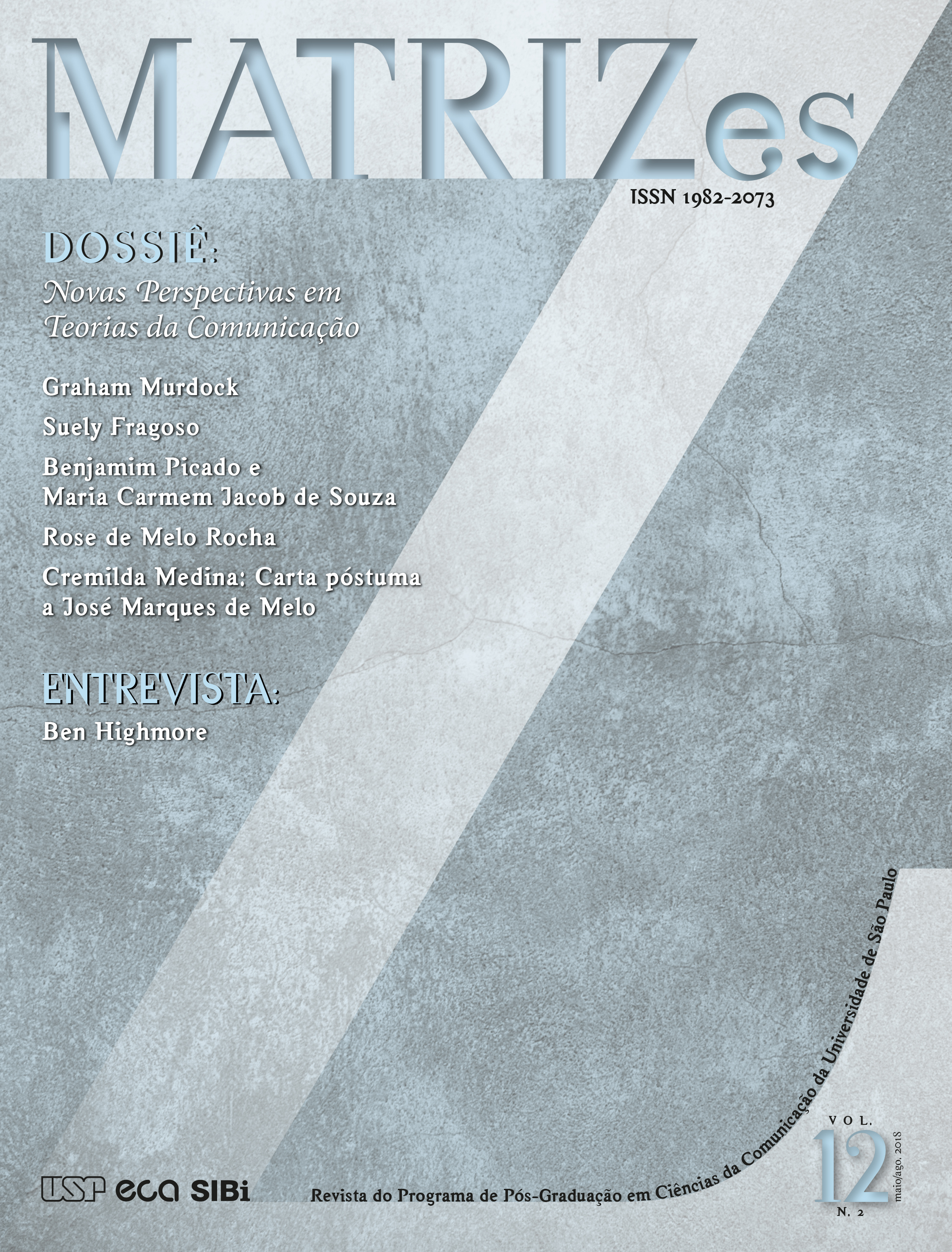The modes of existence of gameplay
an applied exercise with Cities: Skylines
DOI:
https://doi.org/10.11606/issn.1982-8160.v12i2p33-51Keywords:
Modes of existence, Gameplay, GameAbstract
This text presents an application of the theories proposed in An inquiry into modes of existence, Bruno Latour, as a key to understand gameplay, based on game situations from Cities: Skylines. The analysis is presented after reviewing the theoretical framework and a brief presentation of the gameplay situation and highlights the most prominent modes of existence in Cities: Skylines’ gameplay ([FIC], [TEC] e [HAB]) and their crossings ([FIC-TEC], [FIC-HAB] and [TEC-HAB]).
Downloads
References
AUSTIN, J. L. Quando dizer é fazer: palavras e ação. Porto Alegre: Artes Médicas, 1990.
CAILLOIS, R. Man, play and games. Chicago: University of Illinois Press, 2001.
CALLON, M. Society in the making: the study of technology as a tool for sociological analysis. In: BIJKER, W. E.; HUGHES, T. P.; PINCH, T. (Orgs.). The social construction of technological systems: new directions in the sociology and history of technology. Cambridge, MA: MIT Press, 2012. p. 77-98.
CONSALVO, M. Cheating: gaining advantage in videogames. Cambridge, MA: MIT Press, 2007.
FRAGOSO, S. Situação TV. In: MALDONADO, A. E. et al. (Orgs.). Mídias e processos socioculturais. São Leopoldo: Unisinos, 2000. p. 101-114.
FRAGOSO, S. Imersão em games narrativos. Galáxia, São Paulo, n. 28, p. 58-69, dez. 2014. DOI: 10.1590/1982-25542014216692
FRAGOSO, S. A experiência espacial dos games e outros medias: notas a partir de um modelo teórico analítico das representações do espaço. Comunicação e Sociedade, Braga, v. 27, p. 195-212, 2015. DOI: 10.17231/comsoc.27(2015).2097
HUIZINGA, J. Homo Ludens. São Paulo: Perspectiva, 2000.
JAMES, W. The meaning of truth. [S.l.]: Project Gutenberg, 2004. HTML. Disponível em: <https://bit.ly/2yduau1>. Acesso em: 15 fev. 2017.
JAMES, W. Essays in radical empiricism. [S.l.]: Project Gutenberg, 2010. HTML. Disponível em: <https://bit.ly/2JGTBJW>. Acesso em: 15 fev. 2017.
JUUL, J. Half-real. Cambridge, MA: MIT Press, 2005.
LATOUR, B. Jamais fomos modernos. Rio de Janeiro: Editora 34, 1994.
LATOUR, B. On actor-network theory: a few clarifications plus more than a few complications. Soziale Welt, Baden-Baden, v. 47, p. 369-381, 1996. Disponível em: <http://www.bruno-latour.fr/sites/default/files/P-67%20ACTOR-NETWORK.pdf>. Acesso em: 15 fev. 2017.
LATOUR, B. Reassembling the social: an introduction to Actor-Network-Theory. Oxford: Oxford University Press, 2005.
LATOUR, B. Reflections on Etienne Souriau’s les modes d’existence. In: HARMAN, G.; BRYANT L.; SRNICEK, N. The speculative turn: continental materialism and realism. Melbourne: re.press, 2011. p. 304-333. Disponível em: <https://goo.gl/1s7hvG>. Acesso em: 15 fev. 2017.
LATOUR, B. An inquiry into modes of existence: an anthropology of the moderns. Cambridge: Harvard University Press, 2013.
LATOUR, B. “…counter a metaphysical machine with a bigger metaphysical machine.” Does “An inquiry into modes of existence” have a system? Les Temps Modernes, Paris, v. 20, n. 20, p. 1-11, 2015. Entrevista a Carolina Miranda. Disponível em: <https://goo.gl/NS5Ct3>. Acesso em: 15 fev. 2017.
LATOUR, B. et al. AIME: an inquiry into modes of existence, 2013. Website disponível em: <http://modesofexistence.org/inquiry>. Acesso em: 15 fev. 2017.
LATOUR, B.; WOOLGAR, S. Laboratory life: the construction of scientific facts. Princeton: Princeton University Press, 1986.
LAW, J. Actor network theory and material semiotics. 25 abr. 2007. Disponível em: <https://goo.gl/ggcWNM>. Acesso em: 15 fev. 2017.
LAW, J. Technology and heterogeneous engineering: the case of Portuguese expansion. In: BIJKER, W. E.; HUGHES, T. P.; PINCH, T. (Orgs.). The social construction of technological systems: new directions in the sociology and history of technology. Cambridge, MA: MIT Press, 2012. p. 105-128.
LEMOS, A. A comunicação das coisas: teoria ator-rede e cibercultura. São Paulo: Annablume, 2014.
LEMOS, A. Por um modo de existência do lúdico. Contracampo, Niterói, v. 32, n. 2, p. 4-17, abr./jul. 2015. DOI: 10.22409/contracampo.v0i32.732
LUNDGREN, S.; BERGSTRÖM, K. J.; BJÖRK, S. Exploring aesthetic ideals of gameplay. In: DIGRA INTERNATIONAL CONFERENCE, 9., 2009, London. Proceedings…, London, 2009. p. 1-8. Disponível em: <https://goo.gl/vkx4FC>. Acesso em: 15 fev. 2017.
MELLO, V.; PERANI, L. Gameplay × playability: defining concepts, tracing differences. In: SIMPÓSIO BRASILEIRO DE JOGOS E ENTRETENIMENTO DIGITAL, 11., 2012, Brasília, DF. Anais… Brasília, DF, 2012. p. 157-164.
SALEN, K.; ZIMMERMAN, E. Rules of play: game design fundamentals. Cambridge, MA: MIT Press, 2004.
SERRES, M. Theory of the quasi-object. In: ______. The Parasite. Minneapolis: University of Minnesota Press, 2007. p. 224-234.
SICART, M. Defining game mechanics. Game Studies, [S.l.], v. 8, n. 2, 2008. Disponível em: <https://goo.gl/W8qkDJ>. Acesso em: 30 mar. 2018.
VANNUCCHI, H.; PRADO, G. Discutindo o conceito de gameplay. Texto Digital, Florianópolis, v. 5, n. 2, p. 130-140, 2009. DOI: 10.5007/1807-9288.2009v5n2p130
WILLIAMS, F. The Guardian Cities: Skylines challenge: can I build a trulyanti-capitalist city? The Guardian, Londres, 6 ago. 2015. Disponível em:<https://goo.gl/w7JBNG>. Acesso em: 15 fev. 2017.
Downloads
Published
Issue
Section
License
Authors who publish in this journal agree to the following terms:
- Authors retain the copyright and grant the journal the right to first publication, with the work simultaneously licensed under the Creative Commons Attribution License (CC BY-NC-SA 4.0) which allows sharing of the work with acknowledgment of authorship and initial publication in this journal for non-commercial purposes.
- Authors are authorized to assume additional contracts separately, for non-exclusive distribution of the version of the work published in this journal (eg, publishing in institutional repository or as a book chapter), with acknowledgment of authorship and initial publication in this journal.






















